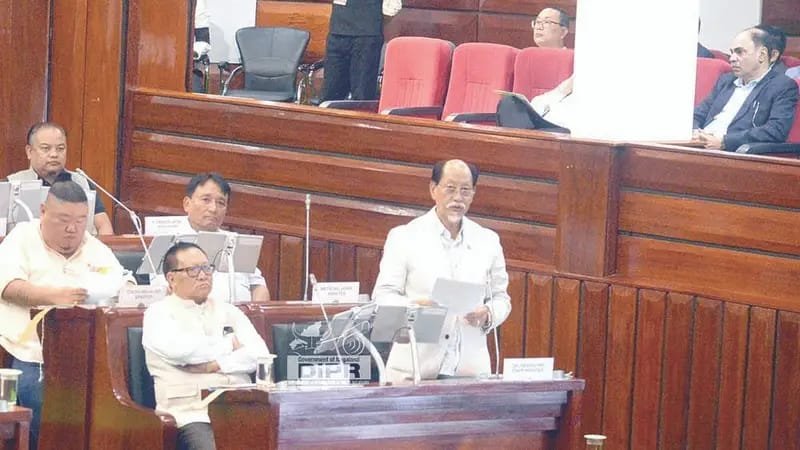Nagaland is grappling with a significant and escalating challenge: rising unemployment. During a recent Assembly session, Chief Minister Dr. Neiphiu Rio characterized the issue as a “burning issue,” underscoring the urgency for a radical change in public mindset. The state’s leaders are calling for a fundamental shift away from the pervasive dependency on government jobs and toward fostering an entrepreneurial spirit among its youth. This crisis, as highlighted by multiple officials, is not merely a lack of jobs but a more profound issue of “unemployability.”
Chief Minister Dr. Neiphiu Rio Flags Raising Unemployment as Major Concern and pointed out that the problem of unemployment is deeply rooted in a societal obsession with government service. This mentality is starkly illustrated by the fact that 20,000 individuals applied for just 150 forest guard positions. With government employment now saturated, the state can no longer absorb the swelling number of jobseekers. This has led to a crucial distinction being made between the “unemployed” and the “unemployable.” As Advisor for Industries and Commerce, Hekani Jakhalu, stressed, a certificate alone doesn’t guarantee a job; without skills, it’s challenging to meet the demands of today’s job market. This sentiment was echoed by Jakhalu, who reminded the Assembly that Nagaland has a very young population, with 40% of its people between the ages of 15 and 35, according to the 2011 Census. This demographic, which is set to be the main driver of the state’s socio-economic development, is facing a widening employment gap. The number of educated youth and the labour force have steadily increased, but opportunities in both the government and private sectors have failed to keep pace. The solution, therefore, lies in not just generating jobs but also in equipping young people with the necessary skills to secure them. In response to this crisis, the Nagaland government is pushing for several initiatives. Chief Minister Rio has directed the Department of Employment and Skill Development to conduct a comprehensive study to recommend corrective actions. He highlighted the Chief Minister’s Micro-Finance Scheme, which provides collateral-free loans of up to Rs. 15 lakhs for skilled youth, as a key tool to promote entrepreneurship. Additionally, the handloom and handicrafts sector has been identified as an area with high potential for commercial viability.
Dr. Kekhrielhoulie Yhome, an Advisor for School Education, emphasized the importance of vocational training under the National Education Policy (NEP) 2020. Vocational subjects are being integrated into school curricula to equip students with practical, employable skills. The government is also set to launch the “SOAR Mission” to upgrade vocational curricula and streamline accreditation systems. Despite these efforts, significant obstacles remain. Chief Minister Rio attributed the failure of major industries in Nagaland to an unconducive business climate caused by the unresolved political issue and multiple taxation. Furthermore, the state lost Rs. 443 crores in the last fiscal year due to government departments failing to utilize sanctioned funds, resulting in central penalties. Minister for Tourism and Higher Education, Temjen Imna Along also presented sobering data showing a 65% increase in Nagaland’s unemployment rate for those aged 15 and above since the COVID-19 pandemic, rising from 4.3% to 7.1%. This increase was particularly sharp among educated unemployed youth in urban areas. He noted that while the worker population has risen, the mismatch between education and job opportunities has exacerbated the situation.
Dr. Yhome also pointed out that Nagaland’s wages are among the lowest in the country under the Minimum Wage Act, 2025, and suggested creating sectoral wage schedules to ensure fair compensation. He encouraged young people to explore employment opportunities outside Nagaland to gain experience and bring back valuable knowledge to transform the local economy. The dialogue on unemployment in Nagaland’s Assembly makes one thing abundantly clear: this is a crisis that demands not just government intervention, but a fundamental societal shift. The insights from Chief Minister Dr. Neiphiu Rio, Hekani Jakhalu, and others paint a comprehensive picture of a state at a critical juncture. The deeply ingrained cultural preference for government jobs has created a severe bottleneck, leaving a vast, skilled, and energetic youth population underutilized. As the data shows, the problem isn’t just a lack of jobs, but a more complex issue of “unemployability,” where qualifications don’t align with the needs of the modern workforce.
Nagaland’s path forward lies in a multi-pronged approach that tackles both the symptoms and the root causes. It requires a radical re-imagining of the state’s economic landscape, moving beyond government dependency and fostering a vibrant culture of entrepreneurship and private sector growth. Initiatives like the Chief Minister’s Micro-Finance Scheme are crucial first steps in empowering youth to become job creators rather than job seekers. At the same time, the focus on vocational training and the integration of the National Education Policy (NEP) 2020 are essential to bridging the skills gap and ensuring that Nagaland’s youth are equipped with the tools they need to succeed in a competitive market. However, these efforts will fall short without addressing the underlying systemic issues. The “unconducive business climate” caused by unresolved political issues and multiple taxation must be urgently tackled to attract the private investment necessary to diversify the economy. Moreover, the failure of government departments to utilize sanctioned funds, leading to central penalties, highlights a need for greater administrative efficiency and accountability. The call for collective responsibility by the Chief Minister resonates deeply—unemployment is not just a government problem, but a collective one involving legislator, officials, parents, and the youth themselves. Nagaland’s journey towards a developed state by 2047 hinges on its ability to embrace a new vision, one that values skill over certificates, enterprise over entitlement, and a collaborative spirit to build a prosperous and sustainable future for all its citizens.

